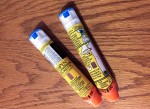A consultant for a pharmaceutical company falsely claimed to be a UCLA professor in a paper about EpiPen pricing.
The American Journal of Medicine published the paper by Leonard Fromer, a former volunteer assistant professor of family medicine, in December that advocated for adding the allergy medication EpiPen to a federal list of preventive medical services.
The journal also published Fromer’s article online on Aug. 21. Both the August and December versions of the article state that Fromer is affiliated with family medicine at the UCLA David Geffen School of Medicine.
According to a statement from the school of medicine, Fromer’s position ended June 30, and articles published after an individual is no longer affiliated with the university should not include a UCLA affiliation.
The journal initially received the paper on June 7 and accepted it after revisions on July 12 with Fromer’s title listed as assistant clinical professor of family medicine, according to the accepted manuscript. The journal later removed the assistant clinical professor title from the paper but still listed Fromer’s affiliation with UCLA.
Fromer declined to comment.
Patrick Dowling, a professor and the chair of the Department of Family Medicine, said the title of volunteer assistant professor is common for doctors in the community who have a limited role in teaching medical students in the clinic or in group discussions. The department has no documentation that Fromer has taught in the last several years and has tried to contact the doctor, Dowling said.
Dowling said that according to Fromer’s original letter of appointment to the volunteer faculty position, Fromer must obtain authorization from the chair of the department for any article he wants to publish in association with UCLA.
EpiPen injectors deliver epinephrine to treat life-threatening allergic reactions to bee stings or usually harmless substances, such as peanuts or penicillin.
Mylan, the pharmaceutical company that sells EpiPens, has faced criticism since August because the price of EpiPens increased about 500 percent from when the company acquired rights to the product in 2007.
Patients currently pay $600 for a pack of two EpiPens. Adding EpiPens to the federal list of preventive medical service, as Fromer suggests in his paper, would allow patients to obtain the medication without paying out of pocket. This is because the Affordable Care Act requires private health insurers and funds public plans to cover preventive services.
Adding the allergy medication to the federal list would also allow Mylan to continue charging high prices for the medication by shifting the costs to insurers, employers and taxpayers.
Fromer said in the paper that EpiPens should be classified as preventive medicine because patients with allergies are at risk for severe allergic reactions.
Kirsten Bibbins-Domingo, chair of the U.S. Preventive Services Task Force, said the EpiPen is not a preventive service because it is prescribed to people who already have severe allergies.
“This is not an area where we would make a recommendation,” Bibbins-Domingo said. “Coverage decisions are the domain of payers, regulators and legislators, whereas our independent scientific process remains focused solely on the evidence about which preventive services are beneficial, despite outside attempts to influence our work.”
In an interview with The New York Times, Fromer said he was not paid by Mylan to write the article. However, according to the paper, Mylan paid third-party writers to create an outline for the paper based on the author’s direction and edit drafts.
Other physicians have refused offers of payment from Mylan to write the paper, citing conflicts of interest.
